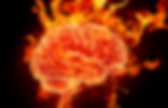

Consciousness. Representation of consciousness from the seventeenth century At one time consciousness was viewed with skepticism by many scientists, but in recent years it has become a significant topic of research in psychology, neuropsychology and neuroscience. The primary focus is on understanding what it means biologically and psychologically for information to be present in consciousness—that is, on determining the neural and psychological correlates of consciousness. The majority of experimental studies assess consciousness by asking human subjects for a verbal report of their experiences (e.g., "tell me if you notice anything when I do this"). Issues of interest include phenomena such as subliminal perception, blindsight, denial of impairment, and altered states of consciousness produced by drugs and alcohol, or spiritual or meditative techniques.
Etymology and early history[edit] John Locke, British philosopher active in the 17th century In the dictionary[edit] Philosophy of mind[edit] 100 Ways To Become More Conscious: How To Raise Your Consciousness. 1. Connect with nature – Go for a walk in the forest, jungle, field of daisies, or wherever you feel like getting a connection with nature.
It is possible to feel at deep sense of peace and oneness when you attempt to connect with nature. As you learn to connect and appreciate nature, you allow your consciousness to rise up. 2. Get your body moving – Exercise and dancing will raise your consciousness by promoting healthy brainwave patterns, healthy neurotransmitter levels, and great circulation throughout your nervous system. 3. . - Whether you are an advanced meditator or a beginner, the benefits are tremendous and will allow you to tap into your highest state of conscious functioning if you stick around long enough. 4. . - Find only friends that align with who you are, your beliefs, and your values – they will make you more conscious. 5. . – If you have the intention to raise your consciousness and state of awareness, you are on the right track. 6. 7. 8. 9. 10. 11. 12. 13. 14. 15. 16. 17.
What Is Consciousness? - Deepak Chopra, Rudolph Tanzi, Menas Kafatos and Lothar Schäfer. The Nature of Consciousness: How the Internet Could Learn to Feel - Steve Paulson. "Romantic reductionist" neuroscientist Christof Koch discusses the scientific side of consciousness, including the notion that all matter is, to varying degrees, sentient. If you had to list the hardest problems in science -- the questions even some scientists say are insoluble -- you would probably end up with two: Where do the laws of physics come from? How does the physical stuff in our brains produce conscious experience? Even though philosophers have obsessed over the "mind-body problem" for centuries, the mystery of consciousness wasn't considered a proper scientific question until two or three decades ago.
By the 1980s, Crick had jumped from molecular biology to neuroscience and moved from England to California. Koch remains on the front lines of neurobiology. Why have you devoted so much of your life searching for the neural roots of consciousness? Koch: Consciousness is the central factor of our lives. What makes consciousness such a difficult problem for scientists to explain? Higher consciousness. Higher consciousness is the consciousness of a higher Self, transcendental reality, or God. It is "the part of the human being that is capable of transcending animal instincts". The concept developed in German Idealism, and is a central notion in contemporary popular spirituality. Philosophy[edit] Fichte[edit] Fichte distinguished the finite or empirical ego from the pure or infinite ego. The activity of this "pure ego" can be discovered by a "higher intuition".
Fichte (1762-1814) was one of the founding figures of German idealism, which developed from the theoretical and ethical writings of Immanuel Kant. According to Michael Whiteman, Fichte's philosophical system "is a remarkable western formulation of eastern mystical teachings (of which he seems to have had no direct knowledge). " Schopenhauer[edit] In 1812 Schopenhauer started to use the term "the better consciousness", a consciousness ... According to Schopenhauer, Religion[edit] Schleiermacher[edit] 19th century movements[edit] Notes[edit] The Mind vs. Brain Debate (What is Consciousness?)